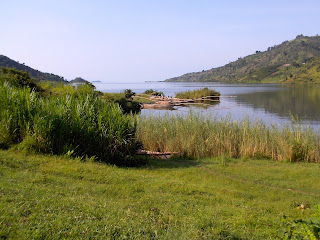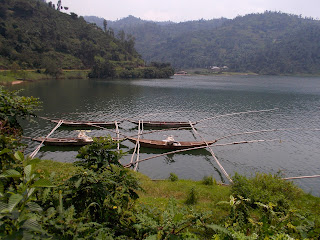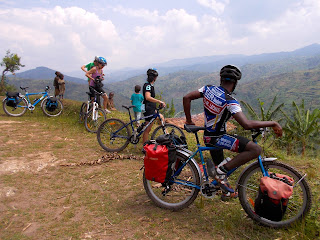Alex and I made the most of our lay over in Amsterdam. It was a wonderful ease back to winter. What a glorious city.
Sunday, February 10, 2013
my two homes
I am back in Canada but still not in Halifax. A large winter storm shut down flights to the Maritimes, so I'm staying with Alex in Toronto. The city is blanketed with fresh white snow, the cafes and shops of Bloor Street are inviting, and the city of 4 million seems so quiet after Nyamirambo.
I have known for a long time that I have two homes and will therefore always feel a sense of pull. I love Canada: the snow, space, clean air, crossing the street safely, new artistic plastic currency, clean lakes, ocean breezes, our values, decent kind hearted people, our excellent health care system. But it is in Rwanda that I truly feel open heart. It is rare in Rwanda not to find people who greet you with warm smiles and always have time to chat. "You are welcome" is heard many times. This means "you are welcome in Rwanda". There is already a strong pull to the many people in Rwanda who I considered good friends (a number of whom call me Mum) but there is also a wish to be there because everyday the work feels so meaningful. There is such great potential for impact with all the teaching we've been doing in Rwanda.
So, much as I love Canada, I consider myself Rwandan as well. I have two identities and two homes. As long as I am capable, I want to continue to contribute in whatever way possible to health and well being in Rwanda.
Here are just a few images of the past five weeks.
 |
| One of the many shops we pass on the way to the hospital |
 |
| Ready for the SAFE Course |
 |
| Highly enjoyable teaching at the SAFE Course |
 |
| Megan welcoming participants |
 |
| Using hands on teaching as much as possible |
 |
| Michelle bringing joy, and a brand new soccer ball, to a team that had been playing with tied up garbage bags |
 |
| The "before" picture of the team. 100 kms of up and down on mountain tracks to Kibuye |
 |
| We cycled through the heart of Rwanda |
 |
| Beautifully dressed women on their way to church in the backcountry |
 |
| Okay, I really did ask "how much longer". Tom, wisely, refused to say. |
 |
| Dean Patrick, truly one of the greatest leaders I've ever met |
 |
| Skills teaching and practice at the sim centre |
 |
| Scenario practice at the sim centre |
 |
| Peter teaching communication skills |
 |
| Cricothyroidotomy skills teaching at sim centre |
 |
| Serena Hotel, our oasis |
 |
| Joshua and Alex. |
with love,
Patty
Thursday, February 7, 2013
sponsoring Karim and Brune
Alex and I are going to sponsor two six year-old children at
the Gisimba Orphanage. The
sponsorship will cover their school fees and books each year. The children are a girl named Brune and
a boy named Karim. They are lovely
children who are bright and playful.
Both are HIV orphans.
There is so much more to write about but we are down to the last 24 hours in Rwanda and the pace has not let up. Alex will post to his blog soon about his safari and successful climb of Mount Kilimanjaro.
 |
| Brune |
 |
| Karim, Alex and Brune |
 |
| Brune and me |
Tuesday, February 5, 2013
TOT at sim centre
Today was the first day of our training of trainers course
at the simulation and skills centre.
Peter, Jon, Michelle, Georges and I have been scrambling to arrange the
course in the last few days. It
was a big success. We had heads of
department, senior members and residents from surgery, anesthesia, ENT, OB Gyn,
and emergency. The morning was
dedicated to teaching a skill at four different stations – knot tying,
intubation, cricothyroidotomy, and suturing. The afternoon was spent on multidisciplinary team
scenarios. Michelle did a great
job as a simulated patient. There
was great enthusiasm about the centre for future teaching of skills and team
dynamics. Tomorrow morning 12
medical students will arrive and the course participants from today will teach
the same skills they have just learned to the med students. Sara, the catering was stellar!
 |
| Jon teaching suturing |
 |
| Peter teaching cricothyroidotomy |
Wednesday, January 30, 2013
Day one of the sim centre
Yesterday we made phenomenal progress on the simulation
centre. This facility is being
established so that a wide range of learners in the health profession can have
a place to rehearse technical skills, such as suturing, and complex team
dynamic, such as managing maternal hemorrhage, without practicing on
patients. There will be capacity
to teach nurses how to set up a table of surgical instruments, medical students
how to insert IV lines, and residents how to manage a patient after severe
trauma.
The centre is a free standing building with two bright,
well-ventilated rooms. We had an
important meeting yesterday with the Dean of the Faculty of Medicine, the new
Medical Director of the simulation centre, the Head of Anesthesia, and a staff
anesthesiologist. Peter, Jon,
Michelle and I wanted the place to look at good as possible before the
meeting. We got up early and
scurried around the centre unpacking the many bags of donated supplies Jon and
Michelle had brought from Halifax and all the equipment from the SAFE
Course. Then we ran to Nakumatt
(the local Superstore plus) where Michelle bought a refrigerator with money
donated by her soccer team for the sim centre. This will be essential for storing animal parts used in
teaching skills. After a quick
coffee at Bourbon Café we returned for the 10 AM meeting to a centre that
looked remarkably transformed already.
We have been waiting a long time for the official
appointment of Dr. Georges as the Medical Director of the Centre. This has delayed spending the money I
received from the simulation grant.
Therefore the space has not been painted and the cabinets have not been
built. During our meeting the Dean
got on his cell phone and in fifteen minutes we had a couple of workers taking
measurements for all the renovations.
After a fabulously successful first day on the simulation
program, Peter and I headed off to the market to load up on mangos, papayas,
pineapples, passion fruits and cheese (all the essentials for life). There was a lively cooking session with
four of us packing into our tiny kitchen.
My good friend, Steven, joined us for dinner and shared many of his
insights on justice and reconciliation.
He will be taking many of our team to visit the church in Nyamata on
Sunday.
 |
| Peter writing a welcome poster in Kinyarwanda |
 |
| Set up for skills and sim |
 |
| Michelle adjusting a mannequin |
 |
| Drs. Georges and Patrick after a very successful meeting |
Check out this time lapse of sim centre set up:
http://www.youtube.com/watch?v=-wjYjYo79Mk&feature=youtu.be
Tuesday, January 29, 2013
in the back of beyond
We've just returned from what is possibly the hardest thing I've ever done physically. We cycled from Gisenyi to Kibuye over two days. This was 100 km total but most of it was up and down steep rocky trails. The second day was nearly 10 hours of cycling. We saw remote parts of Rwanda with friendly people and spectacular landscape. These photos cannot possibly do it justice. We are ever so grateful for Tom at Rwanda Cycle Adventures and his two porters Mansuet and Twisiere. Tom has been working extensively with the local people along the trail to help with their ability to receive cycle tourists and also to have meal and accommodation options. Our first night was at the Kinunu coffee washing station. It is a little bit of paradise with mangos, papaya, pineapples, oranges, and lots of fabulous coffee! Both days we had dramatic thunder and lightening - fortunately the first day it was in the evening when we were cozy but on day two our last ride was in the rain with sunscreen washing into our eyes and one more rocky hill...
We could barely move when we arrived in Kibuye last night but fortunately we were staying at a very comfortable hotel with lovely hot showers.
 |
| Shores of Lake Kivu |
 |
| Banana plants and Lake Kivu |
 |
| Fishing boats |
We are back in Kigali, safe and sound, and ready to get down to work on the sim centre. Jon and Peter have joined our group. More to come.
 |
| With our fabulous porter |
 |
| Just outside Gisenyi |
 |
| Fishing boats |
 |
| Children enjoying the beach where we stopped for lunch on day one |
 |
| Beautiful Lake Kivu |
 |
| Are we there yet? How many more hills??? |
 |
| I should have used more sunscreen |
 |
| Our first day was hilly |
 |
| The second day was more hilly, and much farther!! |
Saturday, January 26, 2013
Friday, January 25, 2013
it's a wrap, now to the hills
The second SAFE Course has finished. The second week ran more smoothly than
the first after a few alterations based on the experience of week one. Most session were run in outdoor
gazebos. This proved to be an
excellent setting with lively bird sounds throughout the day, a light breeze,
and bright daylight.
Fortunately, there was no rain until the last day when, just before the
post-course skills test, it came down in bucket loads. After waiting out the rain, we were
able to complete the final test before the participants regrouped to write
“commitment to change” forms to identify clinical practice changes they hope to
make based on new learning from the SAFE course.
Most of the course comprised a variety of small group
stations where the participants are engaged in discussion, skills teaching, and
simulated scenarios using mannequins or a participant role-playing as patient. There was enough equipment to provide
authenticity to the scenarios.
Participants worked as teams to manage situations such as emergency
general cesarean section, ruptured uterus, or post-partum sepsis from retained
products of conception. They
employed anesthesia knowledge and skills as well as non-technical skills such
as systematic preparation, communication and team working. The course participants had to
role-play as anesthesia provider, assistant, or surgeon. A faculty member, who was assisted by
one or two trainers, conducted each session; trainers are anesthesia residents
and senior technicians, who had been identified by the local staff as having
leadership capability. We ran a
training of trainers course the first day and then mentored the trainers during
the small group sessions so they were able to run the final session
independently.
Planning and preparation for the SAFE Course has taken up
much of the past year. It is easy
to ask if all this hard work is worthwhile. The last day of the course, I had an experience that confirmed
the need for this program. One
participant had struggled with managing a scenario that required resuscitation
of a sick patient. She had been
unable to intubate and did not recognize that the intubation was
esophageal. When this session was
over I stepped away for a bit but when I returned I found our trainer was
working with that participant to teach her intubation. It turns out the participant was
trained on the job (no formal anesthesia teaching) and had never been taught
how to intubate. She practices
anesthesia in a district hospital.
The trainer recognized the problem and taught the participant how to
intubate on the mannequin. The
learner had a huge sense of accomplishment when she performed the skill
correctly.
This situation is an example of both the need for anesthesia
skills and the value in training trainers as local champions for promoting safe
anesthesia practice. It also
illustrates the value of active, hands on learning. If we had conducted these sessions as lectures, how would we
have found out and corrected deficiencies?
We cannot hope to have solved anesthesia problems in Rwanda
with one course but we have begun a journey that involves working together for
a common goal. Anesthesia
providers have met colleagues from around the country. They had a chance to discuss common
challenges they face – lack of equipment, relations with surgeons, and
isolation were frequently mentioned.
The next step is to implement the anesthesia practice network, which is
a system of mentorship to continue to support the anesthesia providers who work
in district hospitals.
Megan and I had to leave the course yesterday afternoon in
order to transport all the equipment to the simulation centre and for Megan to
catch the evening flight back to Halifax.
It was too bad to miss the final banquet for the course.
The past few weeks have been entirely dedicated to the SAFE
Course but now it is time to shift gears and work with colleagues in Rwanda to
establish a simulation centre for teaching clinical skills and team training.
Michelle, who runs the skills teaching centre in Halifax,
arrived safely last night. She
will be sharing her vast experience with our local partners to help create the
sim centre. Before we get to work
on Wednesday, Michelle, Faye and I are going to treat ourselves to a three-day
cycle expedition from Gisenyi to Kibuye.
“Treat” may be the wrong term as this is route entirely consists of
hills…
Michelle, still gorgeous after 30 hours of travel
 |
| The simulation centre - lots of work to do! |
 |
| Entrance to simulation centre on the grounds of CHUK |
Tuesday, January 22, 2013
smooth sailing for day one
The second SAFE Obstetric Anesthesia Course started
yesterday. The first day ran much
more smoothly than last week. We
know what is needed and are ready.
The participants have been incredible: 100% of people who were supposed
to come last week arrived, fully participated in the course, and completed
course evaluations. Again, 100% scheduled for the second week have
arrived.
The participants and faculty have been very happy with the
program. Initially people are shy
but soon jump into role-playing and skills demonstrations in scenarios.
The faculty and participants have greatly enjoyed meeting
colleagues from around Rwanda.
These personal connections are so valuable and will form the basis of
the Anesthesia Practice Network.
Preparing materials for SAFE Course round 2
Gaston practicing "giving an interactive presentation" in the Training of Trainers Course
Angela demonstrates the Universal Anesthesia Machine
Adolphe and Alex practice difficult intubation facilitated by bougie
Monday, January 21, 2013
The Calm before the Storm--TAKE TWO
I had a nice relaxing weekend in Kigali in order to prepare myself for Round 2 of the SAFE Course. I decided not to go to Gisenyi with Patty and Megan as I wanted some time to regroup and relax before gearing up for this week.
This morning I accompanied Angela Enright and Sarah Kessler (from Lifebox) to Kibagabaga to help with some Surgical Safety Checklist Training. For those of you who are not aware, Kibagabaga is a district hospital in Kigali and has been selected as a the site to pilot the surgical safety checklist in Rwanda. Sophie Reshamwalla (from Lifebox) and Beth Riviello have spent endless hours at this hospital teaching the staff about the importance of the checklist and working on local implementation. The process has not been easy but I am confident they will be successful.
After leaving Kibagabaga, we stopped by CHUK so that Angela could visit. She had not been back to CHUK in several years and was eager to see all of the changes. She was quite impressed with the new operating rooms and all that had been accomplished over the past 5 years. I had the privilege of introducing her to the anesthesia residents at academic day. Without her initiative and efforts, anesthesia in Rwanda would not be where it is today. She is actually one of the founders of the Rwandan Anesthesia Residency program.
This afternoon, we arrived back in Rwamagana at our home away from home "The Dereva Hotel" to start our preparations for this week's SAFE Course. Now that we had one course under our belt, we know what we need to do to get organized. Despite a new crew of local faculty and participants, we are confident that this course will be even more successful than last week's.
Stay tuned.....
 |
| Teaching the WHO Surgical Safety Checklist at Kibagabaga |
 |
| Angela Enright with the Rwandan Anesthesia Residents on academic day |
 |
| There is no problem that a nice cup of tea will not solve. |
 |
| Simulation using the Universal Anesthesia Machine (UAM) |
Stay tuned.....
Subscribe to:
Comments (Atom)







